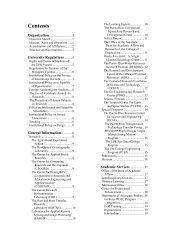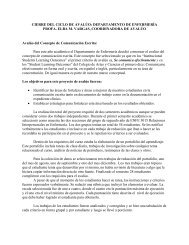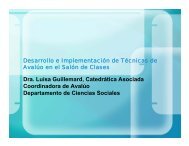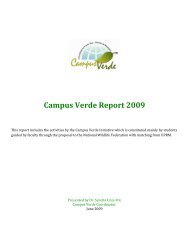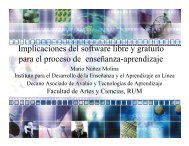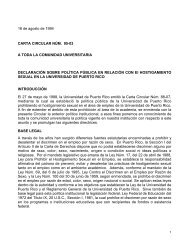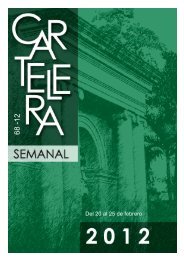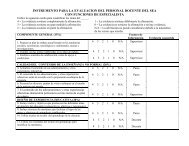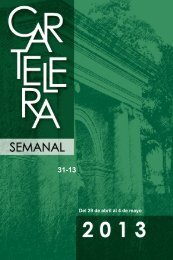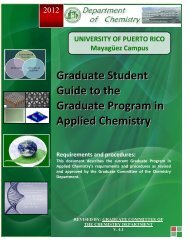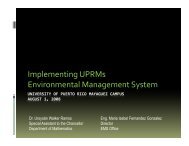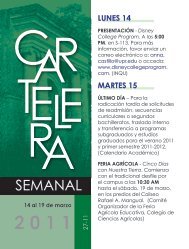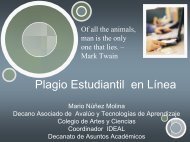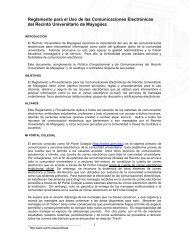Undergraduate Catalogue - UPRM
Undergraduate Catalogue - UPRM
Undergraduate Catalogue - UPRM
Create successful ePaper yourself
Turn your PDF publications into a flip-book with our unique Google optimized e-Paper software.
COLLEGE OF AGRICULTURAL SCIENCES<br />
AGRO 5501. AGRICULTURAL BIOTECHNOLOGY.<br />
Three credit hours. Three hours of lecture per<br />
week. Prerequisites: QUIM 3062 and (BIOL 3015<br />
or BIOL 3300) and (BIOL 3770 or PROC 4016) or<br />
authorization of the Director of the Department.<br />
Biological concepts for biotechnology: enzymes,<br />
nucleic acids, genetic transfer mechanisms,<br />
operons, plasmids, vectors, cloning, DNA<br />
sequencing, monoclonal antibodies, clonal<br />
production and hybridization.<br />
AGRO 5502. AGRICULTURAL BIOTECHNOLOGY<br />
LABORATORY. One credit hour. One three-hour<br />
laboratory per week. Co-requisite: AGRO 5501.<br />
Experiments or demonstrations on microbial<br />
growth, DNA isolation, embryo transfer, protoplast<br />
isolation, tissue culture, plant hybridization,<br />
mutagenesis plasmid isolation and DNA<br />
electrophoresis. Restriction enzymes and other<br />
DNA techniques.<br />
Plant Science Courses<br />
CFIT 3005. FUNDAMENTALS OF CROP<br />
PRODUCTION. Four credit hours. Three hours of<br />
lecture and one three-hour laboratory per week.<br />
Fundamental principles of the growth and<br />
propagation of agronomic and horticultural plants;<br />
the relation of environment to the distribution,<br />
adaptation and utilization of crops; fundamentals of<br />
soil management, tillage, rotation, plant<br />
improvement, pest control, and other practices<br />
related to the production and management of crops.<br />
CFIT 4005. PHYSIOLOGICAL PRINCIPLES OF<br />
CROP PRODUCTION. Three credit hours. Two<br />
hours of lecture and one three-hour laboratory per<br />
week. Prerequisites: BIOL 3435 and QUIM 3002.<br />
Principles of the vital processes of crops: growth,<br />
differentiation and development. Mineral nutrition,<br />
plant-water relationships, photosynthesis,<br />
respiration, photoperiodism and plant hormones.<br />
CFIT 4007. PLANT BREEDING. Three credit<br />
hours. Three hours of lecture per week.<br />
Prerequisite: BIOL 3015 or BIOL 3300.<br />
The improvement of crop plants by hybridization,<br />
selection and induced mutations; methods and<br />
techniques applicable to sexually and asexually<br />
reproduced plants.<br />
DEPARTMENT OF ANIMAL<br />
INDUSTRY<br />
The Animal Industry program design allows<br />
students to acquire knowledge and develop<br />
abilities and experience in the areas of the animal<br />
sciences related to domestic animal production,<br />
including species such as beef and dairy cattle,<br />
poultry, swine, small ruminants, horses and<br />
rabbits. Apiculture (beekeeping and honey<br />
production) is also included in the program.<br />
Students enrolled in the program take courses in<br />
both the basic sciences and applied subjects,<br />
such as feeding and nutrition, breeding and<br />
reproduction, prevention and control of common<br />
diseases and product (milk, meat, eggs, honey)<br />
processing and technology. Upon completion of<br />
all requirements, students are awarded the degree<br />
of Bachelor of Science in Agriculture (BSA)<br />
with a major in Animal Industry.<br />
The Animal Industry Program prepares students<br />
for work in a number of specialized occupations<br />
such as management of dairy, beef, swine or<br />
poultry farms; sales of feed, veterinary products<br />
and farm machinery and equipment;<br />
management of milk or meat processing plants<br />
or as private consultants to the Agricultural<br />
Extension Service or to other governmental<br />
agencies. During the course of their studies,<br />
students are also encouraged to venture as<br />
private entrepreneurs.<br />
The Pre-Veterinary Program is designed to<br />
prepare students wishing to complete a degree as<br />
Doctor of Veterinary Medicine (DVM), with all<br />
the course work in the sciences that are usually<br />
required for admission to the accredited schools<br />
of Veterinary Medicine in the United States.<br />
This is a three-year, non-degree program. Upon<br />
program completion, students receive a<br />
Certificate. Those students who do not gain<br />
admission to a school of veterinary medicine<br />
may easily transfer to the Animal Industry<br />
Program and obtain a BSA upon completing all<br />
requirements.<br />
The Animal Industry Department also offers a<br />
graduate study program leading to the degree of<br />
Master of Science in Animal Industry.<br />
88 <strong>Undergraduate</strong> <strong>Catalogue</strong> 2004-2005



